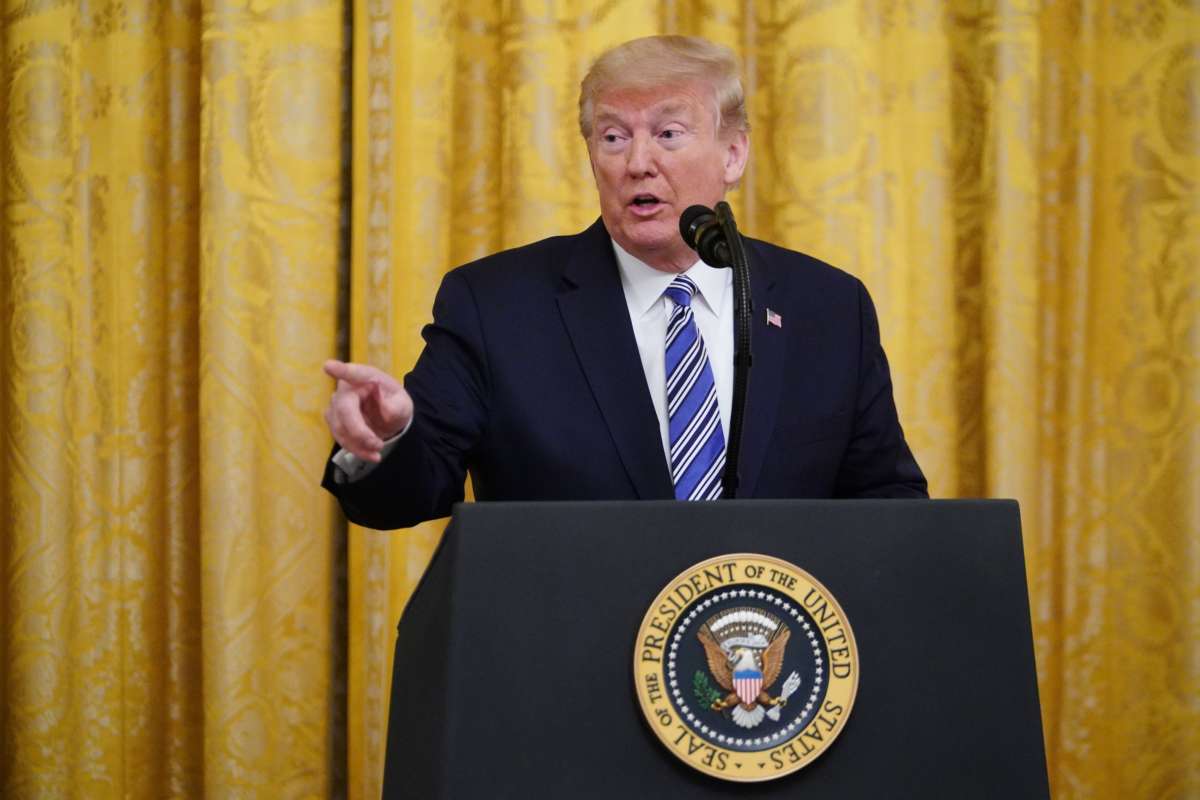Companies with ties to President Donald Trump are swiftly receiving small business loans under the $669 billion Paycheck Protection Program authorized by the federal government amid the coronavirus outbreak.
Whether it’s public companies run by big Trump donors or those that hired lobbyists with connections to the White House, some multi-million dollar loans are going to large companies as small businesses wait for monetary relief.
Ashford Hospitality Trust, a large group of chain hotels, received $96.1 million in loans, the highest amount received by any company under the program. The hotels are run by Trump donor Monty Bennett, who gave $548,000 to Republican candidates and groups this election cycle.
Bennett’s company, along with two others run by him, were able to apply for the loan since the number of employees in hotels across dozens of locations was less than 500 each. The loans for the company were sanctioned after it hired lobbyist Jeffrey Miller, who has raised over $1 million for Trump’s 2020 reelection bid.
While other major companies like Shake Shack and Ruth’s Chris Steakhouses decided to return the loans after facing backlash, Ashford issued a statement that it plans on keeping the aid.
Phunware, a digital company specializing in mass data collection of smartphone locations was paid by the Trump campaign, and has received over $2.8 million in loans through the Small Business Administration.
Low-emission technology producers Capstone Turbine Corp., got $2.6 million in loans, according to Securities and Exchange Commission filings. The company’s board of directors includes Robert Powelson, who Trump appointed to the Federal Energy Regulatory Commission in 2017. He resigned from that post in 2018 to become president of the National Association of Water Companies.
Continental Materials, a Chicago-based construction supply company, received $5.5 million in loans. CEO James Gidwitz donated to Trump’s campaign in 2016 and has a history of contributing tens of thousands to the Republican party. Gidwitz’s brother, also a Trump donor, was appointed by the president to serve as the ambassador to Belgium.
Another company receiving aid is Easypost, an e-commerce business whose CEO Jarrett Streebin has given hundreds of thousands of dollars to the GOP. A hotel company owned by Gordon Sondland and his family was also granted PPP loans. Sondland served as ambassador to the EU and was fired from the administration in February after testifying as a key witness in Trump’s impeachment hearings. He had donated $1 million for Trump’s 2016 inauguration.
The program’s rollout has come into question for shutting out small businesses and allowing large corporations with franchises to access the funds. PPP was meant to fuel small business, but an analysis by the Associated Press found that 94 publicly traded companies received $365 million in loans through April 21. Nine of the loans reached the maximum limit of $10 million, while the average loan size for the program has been $206,000.
The Justice Department is investigating the flurry of small business loans, telling Bloomberg it has found issues with both approved and rejected loan applications.
At least 285 public companies have received over $1 billion in aid so far, but 24 returned loans totaling nearly $161 million, according to FactSquared.
Congress disbursed an additional $320 billion for small business aid after the initial $349 billion ran out in just 13 days. As companies scrambled to hire lobbying firms to reach out to the government, those that hired firms with connections to Trump benefited.
Our most important fundraising appeal of the year
December is the most critical time of year for Truthout, because our nonprofit news is funded almost entirely by individual donations from readers like you. So before you navigate away, we ask that you take just a second to support Truthout with a tax-deductible donation.
This year is a little different. We are up against a far-reaching, wide-scale attack on press freedom coming from the Trump administration. 2025 was a year of frightening censorship, news industry corporate consolidation, and worsening financial conditions for progressive nonprofits across the board.
We can only resist Trump’s agenda by cultivating a strong base of support. The right-wing mediasphere is funded comfortably by billionaire owners and venture capitalist philanthropists. At Truthout, we have you.
We’ve set an ambitious target for our year-end campaign — a goal of $250,000 to keep up our fight against authoritarianism in 2026. Please take a meaningful action in this fight: make a one-time or monthly donation to Truthout before December 31. If you have the means, please dig deep.
